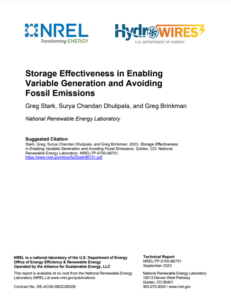Full Title: Storage Effectiveness in Enabling Variable Generation and Avoiding Fossil Emissions
Author(s): Greg Stark, Surya Chandan Dhulipala, and Greg Brinkman
Publisher(s): National Renewable Energy Laboratory
Publication Date: September 23, 2023
Full Text: Download Resource
Description (excerpt):
A common question in grid integration work is, “What is the role of storage in integrating variable renewable generation?” This paper presents a methodology that investigates this question for 2-, 6-, and 10-hour storage for 134 model balancing areas in the contiguous United States. The scenario considered is the role of storage in transitioning to a low-carbon grid (95% carbon reduction by 2035) in the period spanning 2022–2036. The team investigated the marginal quantity of variable generation (VG) that could be supported and the unmitigated fossil generation avoided per megawatt of storage deployed. The main findings were (1) the results are highly sensitive to location (e.g., storage in more promising areas can support over twice as much VG as in a typical area), (2) longer-duration storage (6-hour and especially 10-hour) has significantly more value in terms of its ability to displace more fossil generation per unit of storage added, and (3) as the amount of renewable energy in a system increases, the ability of the next incremental unit of storage to reduce emissions diminishes. The reason for this last point is that the fossil generation that remains in a high-renewables system is kept primarily for reliability purposes and therefore generates few emissions. The paper also presents a graphical depiction of storage and VG complementarity that helps stakeholders better understand the relationship and relative importance of energy and firm capacity in the replacement of fossil generation.
